CABARET VOLTAIRE have long been considered the underground band that is equally and oppositely as quintessentially Sheffield as THE HUMAN LEAGUE’s pop juggernaut.
They have built quite the reputation as being The North’s Angry Young Men – and Somewhat Perturbed Older Men – as seen in the recent and unmissable ‘Made in Sheffield’ documentary. The reputation is, to be fair, slightly unfair as in many interviews – including this one – there has been nary a skerrick of curmudgeonly behaviour.
Named after a Dada-ist nightclub in Zurich, the early Cabs – starting in the pop/psych/glam/prog mire of 1973 – cut their teeth on radical sonic experimentation, sharing the stage with the likes of JOY DIVISION and fellow incendiary and surreal industrialists THROBBING GRISTLE.By 1979, the band begin to form more pop-adjacent sensibilities, releasing their visceral and rather famous post-punk single ‘Nag Nag Nag’ on the nascent Rough Trade label alongside the recently remastered album ‘Red Mecca’ before Chris Watson left the band in 1981 to form the more experimental HAFLER TRIO, shaking up the line up, and forcing remaining members Richard H Kirk and Steve Mallinder to regroup.
Kirk and Mallinder decided to take a tabula rasa approach and make a fresh start. They were thoroughly seduced by the synthesizer and – like NEW ORDER – the hypnotic electro and club music penetrating right through to the north of England from New York’s Danceteria. Sounds including Afrika Bambaataa, Arthur Baker and the New York electro scene.
With the rich world of personal synthesis now at their literal and figurative fingertips, the duo that now comprised CABARET VOLTAIRE took a concoction of their experimental aesthetic, the political turmoil of Britain at the time of the miners’ strikes and some frankly killer grooves to create infectious and idiosyncratic pop music. Dance music. Hypnotic, collagist, surreal, dystopic dance music made between 1983 and 1985, later lost to time (and eBay) as rarities, no longer in print.
The now somewhat more grown-up Richard H Kirk continues to create and record as CABARET VOLTAIRE, but when the opportunity to grasp hold of the lapsed licences to the CV material of that period arose, it was too good a chance to resist. Consequently, Kirk has spent the last 2 years lovingly baking the tapes of the albums, 12 inches and VHS recordings of that time back to life and collating them as ‘#8385 (Collected Works 1983-1985)’ for Mute Artists. He kindly spoke to ELECTRICITYCLUB.CO.UK about this release…
This Box Set cans the years 1983 – 1985. In a neat piece of symmetry, it has taken you two years to curate the box set! What made you decide to devote two years of your life to this project?
To me, it is an important part of the CABARET VOLTAIRE story. The reason it came about initially is that these albums were signed to Some Bizarre / Virgin 28 years ago, and Virgin’s catalogue licence period recently came to an end. I talked with Mute about the possibility of taking the albums on because they have quite a lot of early CABARET VOLTAIRE recordings. They agreed and the rights were moved across to Mute and we started the work to transfer the files from their original tape.
What did you want to get from the process yourself?
I just wanted to make a good job of it and make sure the material we decided to release was quite comprehensive. I really wanted to bring extra unheard of and unseen material to the project. It was originally just going to be a set of CDs and DVDs, but Mute decided they wanted to do vinyl – that’s how the box set came about. Although the box is, obviously, kind of limited, the main thing for me was to make these albums available again as physical releases, not just as downloads. I thought about it the way a writer thinks about their books: a writer would always want their work to be available and published, even if it is now 30 years old.
Was it a very time consuming affair for you? Did you find yourself tempted to do any studio retouching along the way?
I wasn’t doing it 24-7 for 2 years, let’s put it that way. I’ve always got a lot of other things I’m doing, but by the end of this year it will have been a 2 year process.
What took all the time?
Firstly there was the process of locating all the master tapes from the archives and getting them digitised. Doing that involves a process where you have to bake the tapes, because old tapes get something called ‘sticky tape syndrome’. If you try to play tapes from that period now, often oxide sticks to the tape heads and your recording is totally trashed.
You have to be quite careful with older materials, especially Ampex pro-quality tape used in studios. Getting that done was the start of the process, and once they’d been baked I got sent digital copies on CD to listen to. I had to make sure all the songs were the correct versions compared with the released versions. Then we remastered them, and I had to check that the CDs sounded right, that everything was in its right place, and same with the vinyl, we had to check the test pressings.
I also went through a lengthy process of locating old video material, some live shows that were filmed back in the day 30 years ago. We transferred those from VHS to digital, making sure they were intact! To be honest, they’re not fantastic quality… certainly not broadcast quality, but they’re a document of our performances at the time. We’ve also put ‘Gasoline In Your Eye’ on there (a release from the time Mute called an experimental showcase). I also worked closely with the designer for the release, playing with images, doing frame grabs from old archive footage. I had to write some sleeve notes as well so… you know it has been a long and quite slow process, thankfully all finished now.
How do you consider the CABARET VOLTAIRE of 30 years ago compared with your current ideas and artistic output? How do you rate the music you made in that period?
It was both good and bad really – 30 years ago, life was a lot simpler… I was 30 years younger! It was also a very busy time for us. We were in studio and playing live shows a lot. Creating this box set brought back a lot of memories from that time. I remember it as a good period of my life – I was definitely enjoying myself!
Have you emerged from the strangeness of a 2 year flash back restless to create something new – particularly, some new CABARET VOLTAIRE material?
CABARET VOLTAIRE is now just myself. In recent times, that has involved being curator of CABARET VOLTAIRE. However I do have plans to make some new recordings and live performances next year. It would be very different, it won’t involve repetition of the past. I want to do something totally new – it’s more likely to be an art installation project rather than a band, to me that feels more appropriate.
CABARET VOLTAIRE’s albums from this period – including ‘The Crackdown’ and ‘Micro-Phonies’ are thought of as a melange of art, electro and a flirtation with politics/social ideas. Were you hoping to inspire your listeners to question society? Did you consider yourselves a political band?
Back in the day when all of this was recorded, as a band we never over analysed or over intellectualised what we did. We did it by feeling and let other people do the analysis – they could read into it whatever they wanted. We didn’t have long meetings about what we were going to do or what we wanted to say, we just got in and did it.
Did you have a political reaction to your environment at the time though?
We were very aware politically. We were living through times not dissimilar to now; we had Margaret Thatcher who was decimating the country. Especially where I’m from in Sheffield, a lot of people never recovered from the pit closures, At the time, it almost felt like the country was at civil war. I remember we were doing some live shows and travelling around in the tour bus, we were getting stopped and police checked because at the time there was a miners’ strike on and they thought we were going to the strike. Things like that are difficult to forget.
Do you see any relevance to the political sensitivities you had then to the UK now? Do you think this box set is coming out at just the right time?
It’s really kind of sad, but people don’t seem… I think everyone’s given up – just accepting what’s dished out to them by people in power – it’s difficult to do much about it.
Precisely! Do you think the anger over Thatcherite Britain which has been distilled into the 1983 – 1985 albums has a place in 2013?
I believe the baton should be taken up by younger people, sadly. I mean, it’s going to affect their future most of all. But you can easily see why it’s not happening when protests are shut down, and people are cattled and criminalised.
Do you see anyone you think is a suitable inheritor to the early CABARET VOLTAIRE’s ideas? Do you hear much music being made now like yours?
I very much doubt it can happen – music is now mostly about entertainment from what I can tell. There don’t seem to be any real radical people out there saying anything like “f*ck the system”.
Are you still incorporating politics into your own work?
I’ve been doing that in my work for a long time: when The Twin Towers tragedy happened 12 years ago, I was making music against George Bush against the war in Iraq, against Afghanistan. I’ve done that and kept that within the work that I do now. I don’t know whether 30 year old recordings from CABARET VOLTAIRE are going to fire people up – it would be nice if it did but I doubt it – I hope I’m proved wrong.
Are you happy that there’s vinyl coming out with this release? Are you a vinyl purist?
I still have a collection of vinyl – and I certainly still play vinyl. Although when I DJ, I tend to record my vinyl and burn it to CDs. But there’s nothing better sound wise than vinyl, especially in terms of bass. CDs are just easy and convenient, and I’m certainly not a download person. I’ve never downloaded music in my life – legal or illegal. It’s just not how I choose to consume music, but I’m not a snob about it. The vinyl in our box set sounds great!
I’m curious to know what your current studio set up is like?
I work in a couple of different ways. If I’m doing more dance based music, I’ve got an Atari 1040ST computer and some really old software called C-lab. It’s primitive, but it’s really spot on in terms of timing. I use that, samplers and old analogue synths with MIDI – that’s how I create part of my work. However I also have Protools and a 10 year old G4 Mac with a few plug-ins… so it depends what I’m doing and what I’m wanting to achieve.
What analogue synths do you still use now?
The keyboard I’ve been using recently I bought in ‘83 when recording ‘The Crackdown’ – the Roland Juno 60. I’ve used it a lot over the years but sadly it has now lost its capacity to save patch memory and needs to be repaired – it doesn’t save sounds anymore. But it still makes some fantastic sounds. I also have an SH09 synth I bough in the late 70s that I still use on a lot of stuff, and a Roland Juno 106 which is fantastic for bass and sub-bass.
Sadly a lot of my analogue stuff is starting to break, I don’t have a lot of outboard effects now because they have died on me – and it’s difficult to find someone in Sheffield who can repair old synths. I don’t have a car so that makes it hard. But I love all that stuff, I definitely prefer it to using plug-ins or softsynths.
Music writers in the past have been quite critical of this period of your work, compared with the more experimental music prior – but it seems to have found its time – it’s not uncommon to hear ‘Sensoria’ or ‘Just Fascination’ these days, as industrial dance has found its second spring. Did you feel surprised at the time by the response?
There have been things written about the ‘83 to ‘85 period where people wrote that it was “bad pop music”. Personally, I think they completely missed the point. Most of what I’ve done, I stand by including these records. I love the earlier CV stuff and equally love what I did with Mal (Steve Mallinder) later.
Personally, I prefer this period to the earlier CV releases.
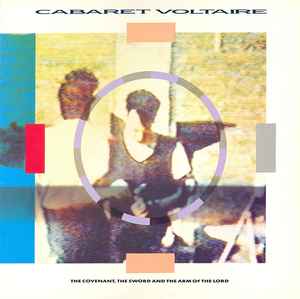 It’s so good to hear someone say that. There’s some kind of weird prejudice out there still I think from the ‘83 – ‘85 period ‘The Covenant, The Sword & The Arm Of The Lord’ is one of my favourites.
It’s so good to hear someone say that. There’s some kind of weird prejudice out there still I think from the ‘83 – ‘85 period ‘The Covenant, The Sword & The Arm Of The Lord’ is one of my favourites.
We created and produced it all ourselves in a studio in Sheffield. It was about then we started to use samplers and digital equipment. I think it’s a really good album but a lot of people wouldn’t agree with me.
It can’t be denied that the direction you took after Chris Watson left – sonically – was a real departure from the post-punk frenetics of ‘Nag Nag Nag’.
It was partly because with Chris leaving we didn’t want to repeat what we’d done before. We were also getting more and more into New York electro – in the early 80s, a lot of great new stuff was coming out of New York – really exciting sounds. We thought: “you know, this is the way forward, to make the music more dancefloor friendly, and hopefully it would get through to more people”.
Did you have ambitions of becoming more accessible – and potentially more commercially successful?
We definitely retained a darker more subversive side to what we were doing, but we definitely wanted to reach more people. If we made something darker, the beats would hold it together. It wasn’t any kind of formal decision, it just seemed natural. We’d been big fans of dance music in the 70s but it was the technology that was the missing link. Suddenly we got programmable drum machines and sequencers, and with that we got the repetition you need for dance music – it brought that sound within our grasp.
Did you have limits on how far you were prepared to go in your songwriting to be more commercially successful?
We weren’t daft you know – it seemed obvious to us that if we were a bit more commercial then more people would listen to what we’re doing, and it proved correctly. ‘The Crackdown’ went into the Top 40. It was kind of an experiment. But, we never worked with producers, we always produced ourselves. A lot of 80s music is very recognisable because of the producers who were big at the time, Trevor Horn etc. Instead, we worked with very good engineers – like Flood – but kept control. Even when we worked with remixers, we went into the studio with them so could maintain control.
How about now? Would you take the money if you were offered a lucrative commercial deal – a jingle or a chart pop remix?
I would remix anyone if they pay me enough money. I’m a gun for hire – no matter how bad something sounds, you can make it sound cool. *laughs*
ELECTRICITYCLUB.CO.UK gives its sincerest thanks to Richard H Kirk
Special thanks to Zoe Miller at Mute
‘#8385 (Collected Works 1983-1985)’, a six CD / four vinyl / two DVD box set is available now via Mute Artists
http://mute.com/artists/cabaret-voltaire
https://www.facebook.com/CabaretVoltaireOfficial
http://shop.cabaret-voltaire.net/
Text and Interview by Nix Lowrey
21st November 2013

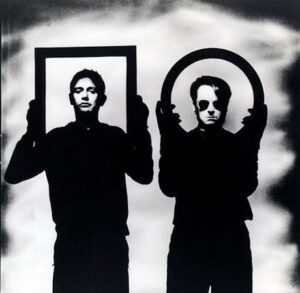
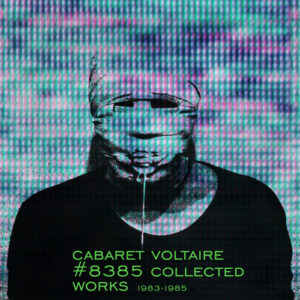
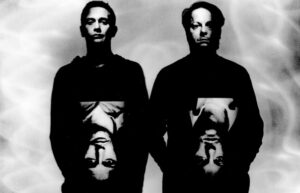
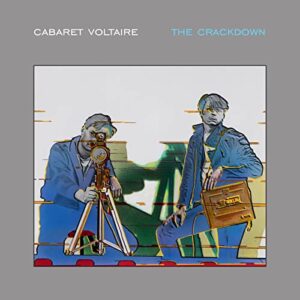
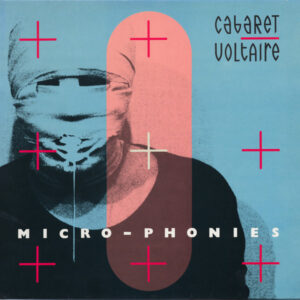
Follow Us!